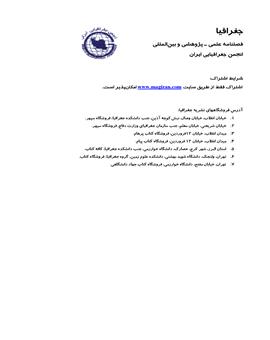Electronics City the role in promoting of indicators of sustainable development with emphasis on electronic banking case study in Karaj
Subject Areas :Alireza Estelaji 1 , Najmeh Shahtalebi 2
1 - یادگار امام ره
2 -
Keywords: Sustainable urban development, Electronic City , Electronic banking, citizen participation,
Abstract :
Issues and problems in the issue of air pollution, heavy traffic and wasting time on the streets, increasing the administrative and commercial activities of citizens in cities, increasing population and lack of fitness facilities and services, so that for various reasons has been formed in cities As well as citizens increasingly demand to provide satisfactory service and quality, and the municipal and state slogan and policy managers to focus on sustainable urban development, decision-making and planning based on technology and techniques the world's urban management is not only inevitable but also necessary and enter the world of electronic logical and convenient to the city is needed. One of the most widely used and most central urban needs of electronic services, electronic banking services, which with its activities is an important contribution to sustainable urban development. Therefore, this research was carried Metropolis research. The study was cross-sectional and library studies and field research was conducted using questionnaires. The results of the test the hypotheses using one sample T-test or One sample T test and Spearman correlation was also Shows that electronic banking will have an important role in the realization of sustainable urban development and in this regard citizens as key stakeholders have a direct influence on this issue and the possibility of achieving the desired goals is not possible without the participation of citizens.
1. بابايي، محمدعلي؛ احدي، پري(1389)، بررسي رابطه ويژگيهاي شخصيتي و رفتار خريد كاربران اينترنت در ايران، فناوري اطلاعات، 2؛
2. جمالي غلامرضا؛ هاشمي، مهدي(1391)، سنجش روابط بين عوامل مؤثر بر ريسك پروژههاي فناوري اطلاعات در بانك ملت استان بوشهر با استفاده از تكنيك ديمتل فازي، فناوري اطلاعات، 3؛
3. حضرتي ليلان، اكرم؛ خديوي، اسدالله (1389)، بررسي تاثير فناوري اطلاعات ارتباطات (شهرالكترونيك) بر ساختار كالبدي شهر از ديدگاه كاركنان منطقه 1 شهرداري تبريز، فصلنامه فراسوي مديريت سال سوم، شماره دوازدهم بهار؛
4. حمیدیزاده، محمدرضا؛ قرهچه، منیژه؛ عبدالباقی، عبدالمجید (1386)، بررسی عوامل زمینه¬ساز، چالش¬ها و تنگناهای توسعه بانکداری الکترونیک، پژوهشنامه علوم انسانی و اجتماعی (ویژه مدیریت)، سال هفتم، شماره بیست و هفتم، زمستان؛
5. رهنورد فرج¬الله و محمدي داريوش (1386)، ارزيابي مراحل تكاملي دولت الكترونيك در ايران، پژوهشنامة علوم انساني و اجتماعي »ويژه مديريت« سال هفتم، شماره بيست، زمستان؛
6. زريباف، مهدي؛ حسيني، سيدمهدي؛ بزرگمهر، بتول (1390)، بررسي تطبيقي ترجيحات رفتاري كاربران بانكداري الكترونيك و سنتي (مطالعه مورديی: بررسي تمايل مشتريان بانك ملت استان سمنان به استفاده از خدمات بانكداري الكترونيك) فصلنامه مديريت، سال هشتم، شماره 21؛
7. زیاري، کرامت¬الله؛ مهدي، علی¬مهدیان؛ بهنمیري، معصومه (1392)، مدیریت شهري الکترونیک؛ گامی نوین در تحقق پایداري شهري، بررسی وضعیت شهرداري الکترونیکی در کلان شهرها (مطالعه موردي شهر قم)، فصلنامه اقتصاد و مدیریت شهري، شماره سوم؛
8. سرفرازي، مهرزاد؛ معمارزاده، غلامرضا (1386)، پارادايم دولت الكترونيك ضرورتي اساسي در استقرار شهرداري الكترونيك، چهارمين كنفرانس بينالمللي مديريت فناوري اطلاعات و ارتباطات، سالن همايشهاي هتل بين¬المللي المپيك بهمن ماه، تهران؛
9. سعیدنیا، احمد (1383)، مجموعه کتابهاي سبز شهرداري تهران: سازمان شهرداريها و دهیاريهاي کشور؛
10. شهرداری کرج (1395)؛ طرح جامع شهر کرج، 1390، استانداری البرز؛
11. قرخلو، مهدی؛ حسینی، سیدهادی (1385)، شاخصهای توسعه پایدار شهری، مجله جغرافیا و توسعه ناحیهای، شماره هشتم؛
12. کیانی، اکبر (1391)، شهر هوشمند ضرورت هزاره سوم در تعاملات یکپارچه شهرداری الکترونیک (ارائه مدل مفهومی-اجرایی با تأکید بر شهرهای ایران)، فصلنامه جغرافیایی آمایش محیط، 14؛
13. مرکز آمار ایران (1395)، سرشماری عمومی نفوس و مسکن؛
14. هاشميان، مژده؛ عيسايي، محمدتقي؛ ميكائيلي، فتاح؛ طباطبائي، محسن(1391)، عوامل مؤثر بر پذيرش ابزارهاي بانكداري الكترونيك از سوي مشتريان (پيمايشي درباره بانك سامان)، مديريت فناوري اطلاعات، دوره 4، شماره 11، تابستان؛
15. Ebbers, W. E., (2007),“Electronic government: Rethinking channel management strategies,” Government Information Quarterly, 22;
16. Hall, tim, (2005), Urban geography, 3rd edition, Rutledge, London and New York;
17. Kuismaa Tuire, Laukkanena Tommi, Hiltunen Mika. (2007), Mapping the reasons for resistance to Internet banking: A means-end approach, International Journal of Information Management; 27: 75–85;
18. Lee K.S., Lee H.S., Kim S.Y. (2009), Factors Influencing the Adoption Behavior of Mobile Banking: A South Korean perspective, Journal of Internet Banking and Commerce; 12(2): 247-260;
19. Liao, Ziqi & Michael To Cheung, (2002), Internet-Based Banking and Consumer Attitude, Information Management, No. 39, p. 283- 295;
20. Pennathar, Anita K. (2001), E-Risk Management for Banks in Age of the Internet, Journal of Banking & Finance, No.25,p.2013- 2123;
21. Poon Wai-Ching. Users’ adoption of e-banking services: the Malaysian perspective. Journal of Business & Industrial Marketing 2008; 23/1: 59– 69;
22. seits, J.L. 1995, global issues, Blackwell, Cambridge;
23. W.G. Newman, Peter. ,(1999),"Sustainability and cities: extending the metabolism model", Landscape and Urban Planning 44:, (219-226);
24. Yiu Chi Shing, Grant Kevin, Edgar David. ,(2007), Factors affecting the adoption of Internet Banking in Hong Kong-implications for the banking sector. International Journal of Information Management; 27: 336–351.


